PERUVIAN MINIBOTS + BLUE/YELLOW GEARS
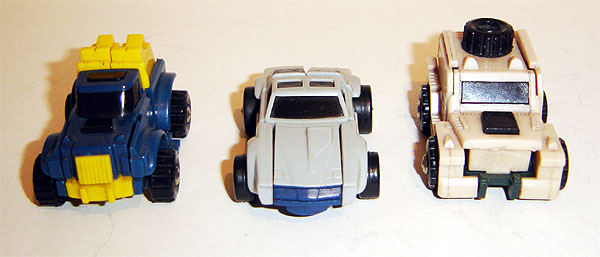
The world of Transformers continues to grow and become stranger than any enthusiast or collector could ever have imagined. From the original Diaclone and Microchange toys to the strange Transformers packaging variants of Europe, or the exclusive Japanese Transformers to the new E-hobby repaints of reissues. However some of the the real oddities and eye-openers come from South America where the Transformers released were usually limited to the well-loved Minibots and a whole host of repaints.
The countries often associated with repainted and exclusively-coloured minibots are Brazil and Argentina where the toys were manufactured and distributed by Estrela and Antex respectively. In Argentina and Brazil they were marketed under the name "Robocar" and came on TF-style cards. Argentina received Bumblebee (Volks), Cliffjumper (Carrera) and Windcharger (Camaro). Brazil received Volks, Carrera, Camaro and Gears (Pick-Up), Brawn (Jipe) and Bumblejumper (Sedan). Brazil then released a second series of minibots called Optimus vs Malignus (a good vs bad scenario) with further repaints of the aforementioned minibots.
One country that was previously NOT associated with exclusive
minibots but is now considered to be of equal significance in the minibot
universe is Peru. Peru received not only the Bumblebee, Cliffjumper, Gears,
Windcharger and Brawn moulds, but they also had Huffer. Bumblejumper however
did not make it to Peru.
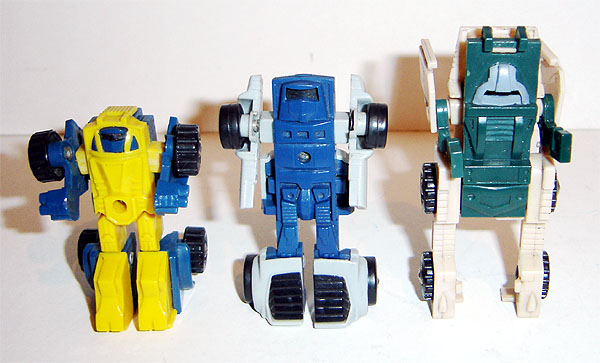
The way these minibots were manufactured and marketed in Peru, however, is somewhat different to the way they were marketed in Argentina and Brazil. First of all, they were actually labelled "Transformers" and the toys have Hasbro/Takara copyrights! The company thought to be responsible for distributing these toys in Peru is Lynsa. They have been referred to by some Peruvian transfans as 'Lynsaformers' and apparently were marketed as such back in the day.
Before I go any further I would like to thank Jose Antonio Suarez Rojas for his amazing contributions on the subject of Peruvian minibots and his constant willingness to help and assist in uncovering the mystery that surrounds these toys. Jose says that the toys came in bubbles similar to US Transformers cards with the information in Spanish instead of English. They were apparently sold in supermarkets and also in popular markets in Peru. They were cheap in comparison to the expensive Hasbro/Takara Transformers which were available in Peru at the same time. Here is a quote from Jose:
"They even had TV commercials! I still remember the tune:It was something that translated would be like: Transformers, Transformers, they are not only what they seem to be, they are much more action!"
The fact that these toys had their own TV commercials
suggests that they were more than just some bootleg line of cheap reproductions.
The fact that they are Hasbro/Takara stamped is another major indication
of their significance to Transformers. However, one of the controversial
aspects of the Peruvian Transformers discussion is that a number of Peruvians
have never heard of Lynsa, and Frank George Valoczy of Minitropolis says
that he can only find reference to Lynsa being an Argentinian plastics
company. It is not entirely impossible in my opinion that Hasbro/Takara
licensed these toys but did not have the facilities in Peru to manufacture
them there, therefore made them in Lynsa's factories (possibly in Argentina)
and exported them for sale in Peru and possibly Chile as well. This would
make the situation very similar to that of the early European Transformers
produced in Milton Bradley factories and with MB badges on the packaging
but Hasbro/Takara markings on the toys themselves.
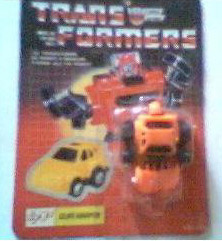
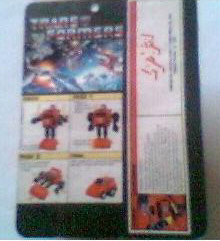
The picture above was taken from an auction for a carded orange Cliffjumper from Chile. The logo in the bottom left hand corner (and on the techspec) does appear to say "LYNSA" and it is on a Transformers card. The Cliffjumper does not have any Autobot markings or stickers and appears to have an unpainted face. I'll come on to the significance of that a little later.
Jose also informs me that he believes that in Peru not only did they get Windcharger, Bumblebee, Cliffjumper, Brawn, Gears and Huffer in regular colours but also FIVE repaints of each minibot! That gives a possible total of 36 Peruvian minibots, NONE of which are the same as a US Transformer, and you're going to see why none of them are the same if you have not already. Take a look at the two pictures at the very start of this article because the three minis there are Peruvian minibots. None of them have any chrome paint, which adds to the belief that they are of bootleg quality, when in fact the quality is at least the same as the Mexican IGA Transformers. They just happen to not have any chrome on them. Also, the Bumblebees and Cliffjumpers have unpainted faces and plastic (not rubber) tires. Here is a preliminary listing of the Peruvian minibots either seen/pictured or remembered by Peruvian transfans so far:
Bumblebee: Yellow (Standard TF colour - no chrome - unpainted face - plastic tires - black headplate) Red (no chrome - unpainted face - plastic tires - black headplate) Peach (no chrome - unpainted face - plastic tires - black headplate)
Cliffjumper: Red (Standard TF colour - no chrome - unpainted face - plastic tires - black headplate), Orange (no chrome - unpainted face - plastic tires - black headplate)
Gears: Blue/Red (Standard TF colour - no chrome), Blue/Yellow (no chrome), Orange/Yellow (no chrome)
Brawn: Green/Cream (Standard TF colour almost- no chrome), Cream/Green (no chrome)
Windcharger: Red/Grey (Standard TF colour - no chrome), Grey/Blue (no chrome), Green/Yellow (no chrome)
Huffer: Peach/Blue (Standard TF colour almost - no chrome,) Peach/Yellow (no chrome), Blue/Yellow (no chrome), Red/Yellow (no chrome)
As you can see, there are still many gaps to be filled. To again quote Jose:
"With no physical confirmation but 90% true considering all the people I have asked: different versions like Green, beige, blue, white for each one. One interesting data, all the extra colors for Gears and Huffer seemed to always have had yellow plus another color. Windcharger seemed to be the one with more color variants since the 2 I have found had 2 different colors over it and according to some friends they said there was a green and yellow one. All of this info was considered as certain after getting at least 3 different people remembering it."
Until any pictures surface though, it remains hearsay and speculation although I would personally put a lot of stock in what Jose has to say. I will update this article in the future with any further confirmations and available pictures. Speaking of pictures, here are the orange/yellow and blue/yellow Gears:
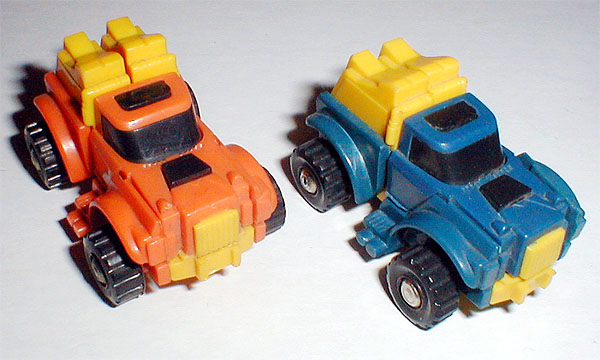
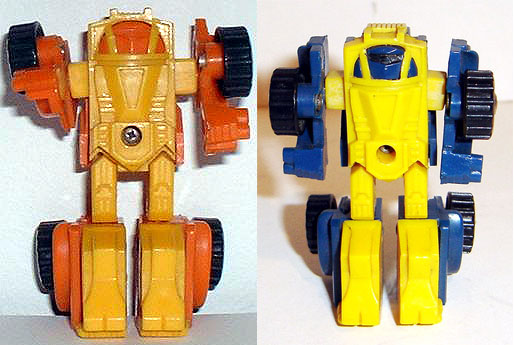
Peach/Yellow Huffer...
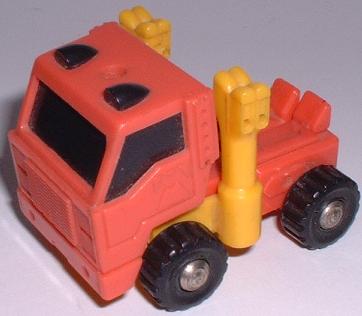
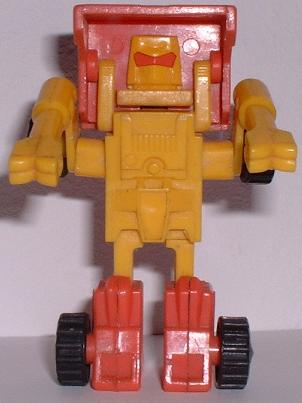
Blue/Yellow Huffer and Red/Yellow Huffer...
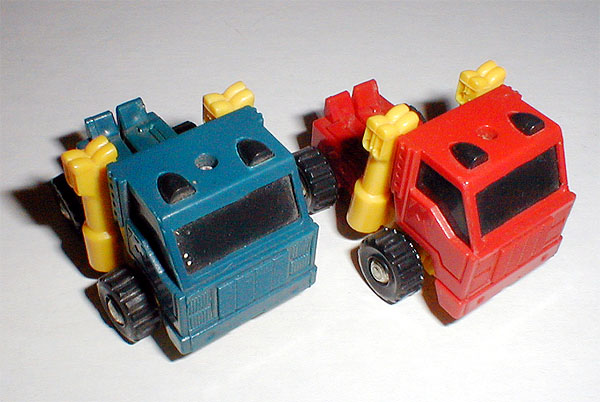
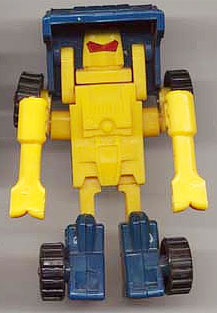
Yellow Bumblebee and Green/Cream Brawn (the inverse of the Brawn at the start of the article)
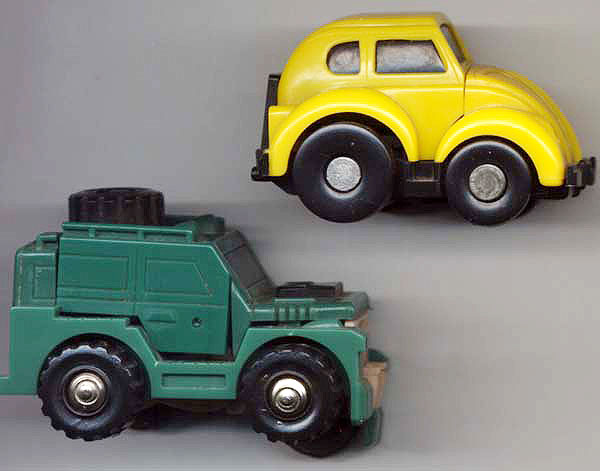
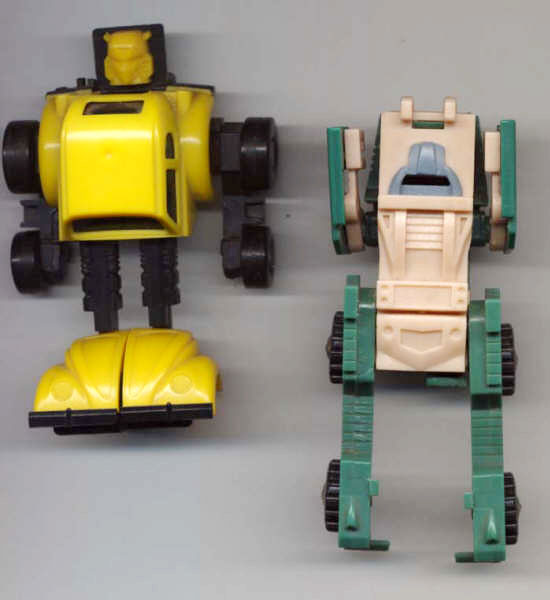
As you can see with all of the Peruvian minibots, there
are some very new and unfamiliar colour schemes, and a complete lack of
chrome paint. They're not as simple as they first appear either, for example,
I would never have thought the Blue/Yellow Huffer would have red eyes
as you can see above. The Grey/Blue Windcharger and Cream/Green Brawn
are of course shown right at the start of the article. Here's the peach
(or orange, depending on who you speak to) Bumblebee...
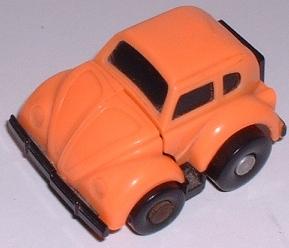
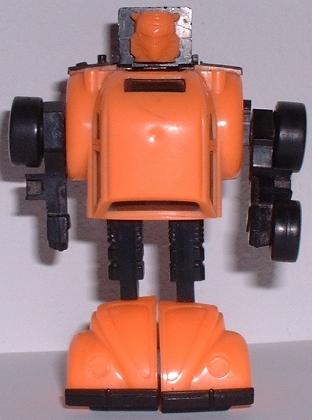
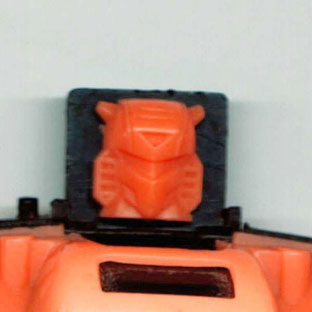
There's no rubber on the tires, the headplate is unchromed black plastic and the face is unpainted. As with all the other Peruvian minibots, there are no faction symbols or stickers of any kind. In fact, he looks very much like the orange Cliffjumper at the beginning of this article. When you add in Jose's recollections of the toys' properties in general and his recollection of the original Lynsa TV commercials and marketing campaign, I think it's a strong bet that the carded orange Cliffjumper shares the same origins as the above Peruvian minibots. Whether that particular one was purchased in Peru or Chile remains unknown. The cards for the others though are probably very similar.
Indeed, in Peru, thanks to the gracious help of Jose and his friend David Buenaño they have provided me with the remains of two Peruvian techspecs cut from a childhood-owned Peruvian Huffer card and a Peruvian Brawn card. Have a look at these:
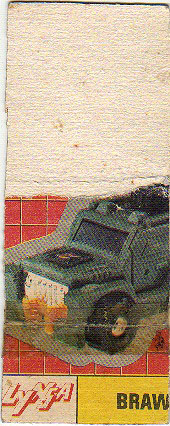
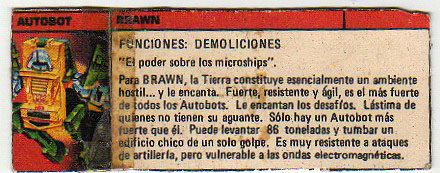
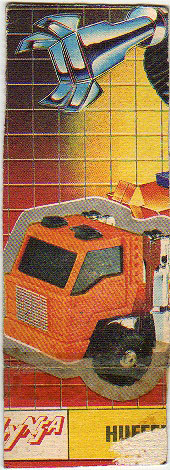
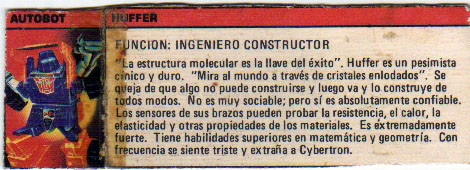
As you can see, the card front clearly says "LYNSA" next to the name of the Transformer. The back of the cards show part of the techspec and as Jose says, the text is in Spanish. Now you might be wondering as a child, why did David cut off part of the techspec and not include the all-important techspec graph and statistics for the above two. Well, go back and look at the carded orange Cliffjumper at the start of the article, specifically the card back. There IS no graph or statistics, only "LYNSA" in big lettering! So that explains that! However, before these techspecs were found, people were not convinced of Lynsa's involvement.
I was contacted recently by another Peruvian collector called Jose Luis Altamirano, and he provided the following information from his experience and memories of Transformers in Peru:
"The transformers arrived to peru on 1986, the series was airing since 1985 and it had a huge success, so 2 companies decided to bring some of the toys to this country, they were "Bakelita & Anexos S.A" (BASA) who produces toys and plastic products until now, and HUDE, who now only produces plastic articles for cleaning (note the similarities with lynsa, they all are industries involved with plastic now).
Both of this enterprises had a large history of working with international toy brands and importing (some times producing) them to Peru, to name some examples BASA handled the Barbie toys for about a decade, and HUDE imported the "Saint Seiya" figures on the years 1994-1995.
I'm not denying that Lynsa was involved with Peruvian minibots, but I think probably what happened is that after one year or two of HUDE & BASA distributing the minibots, it stopped being a good business for them so they transferred it to Lynsa for the next 3 years, after that the show wen't off the air, it returned for six months on the year 1992, but then it dissapeared until this days.
There is a big problem with the toy industry in this country: piracy. That's why I think this 2 enterprises stopped involving with the importation of toys, it was impossible for them to compete. BASA even got into bankruptcy a few years ago and has returned under a different administration.
Returning to the minibots, there is something that is totally wrong with the article: Lynsa did not appeared in the TV spot of the toys, the spot ended with the exact phrase "de HUDE, bueno con B de BASA" that is very clear on my memory, so I think that's something that needs correction."
But Jose Antonio Suarez has an explanation for this as well:
"Well, I was talking about his to a friend and he explained me something that has sense see...BASA was indeed transformed into HUDE which brought Saint Seiya figures but before that BASA was in charge of distributing the ORIGINAL G1 Minicars (US ones, not Peruvian variants). My friend said that he remembers the old original G1 minicars used to come with a little BASA sticker, I also remember that when I used to go to a little store on my neighborhood that used to have Seaspray and Beachcomber on display and they did had the BASA sticker."
Now Jose Suarez has always maintained that US minibots were available in Peru, so it appears that the BASA theory comes from US minibots being stickered with BASA labels to show that they were distributing the US toys. This comes from discussions with his friend Sandro Arias. And also, nowhere in Jose Luis Altamirano's statement does it say that the minibots he is referring to are the variant ones. The adverts he is referring to could well be for the BASA-distributed US minibots and Jose Suarez's recollections are of the Lynsa-distributed Peruvian minibots.
So the overall picture forming now is that US minibots were imported into Peru and distributed by BASA/HUDE with labels on them to that effect, and later, Lynsa started to release the Peruvian "Lynsaformers" minibots with the distinct variations described within this article. Most probably as Jose Luis Altamirano says, it may have become bad business for BASA/HUDE.
The spotlight will now focus on the Blue/Yellow Gears
in order to gain further insight into the properties of the Peruvian minibots.
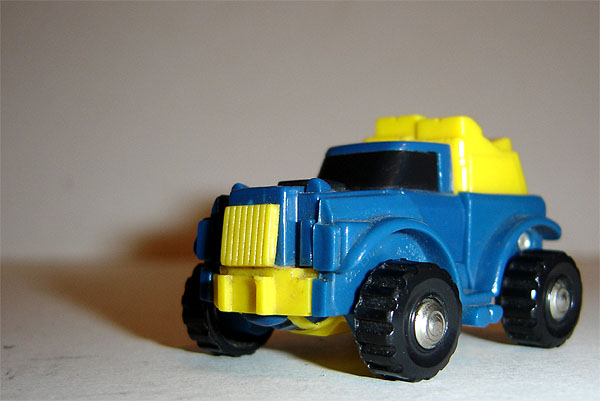
This blue and yellow Gears from Peru is probably one of the more common ones found so far, if you can even use the word 'common' when referring to these toys. So far at least two of these have been found in good condition that I personally know about, and that's 2 more than most of these minibots!
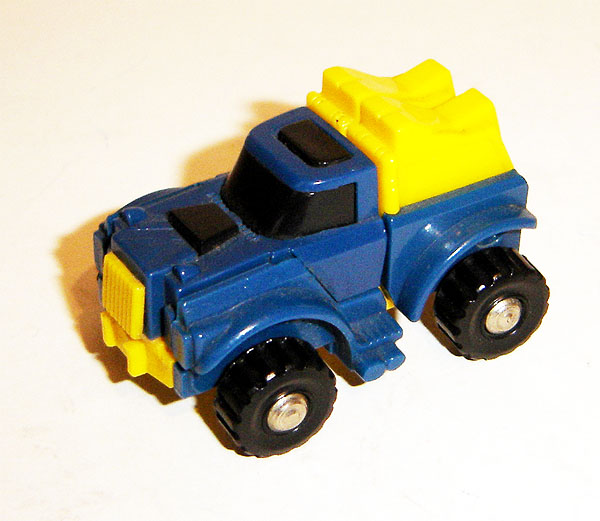
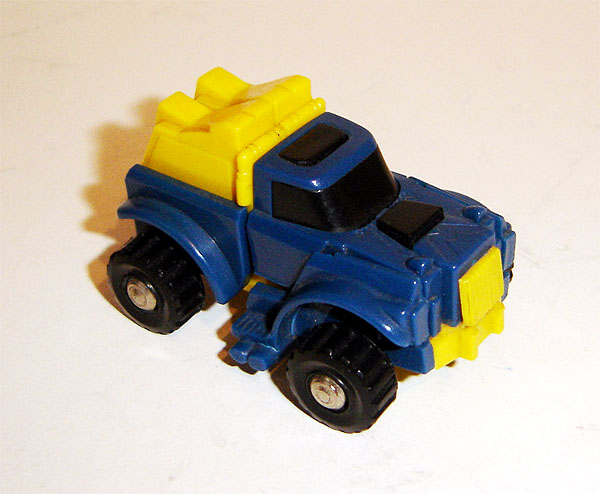
You can see from the above pictures that the grill on
the front of the vehicle is just yellow unchromed plastic, very much in
keeping with all the other Peruvian minis found so far. Blue and yellow
is a common combination used on TF minibots and continues to work well
in the case of the Peruvian Gears, especially as the blue is a little
darker. A lovely contrast and an attractive minibot is the result.
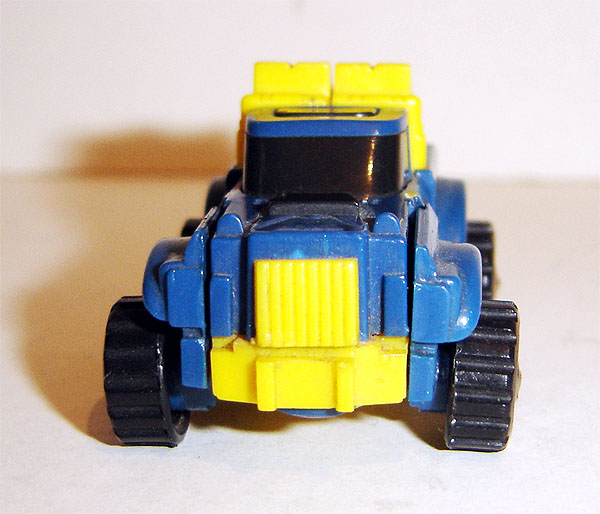
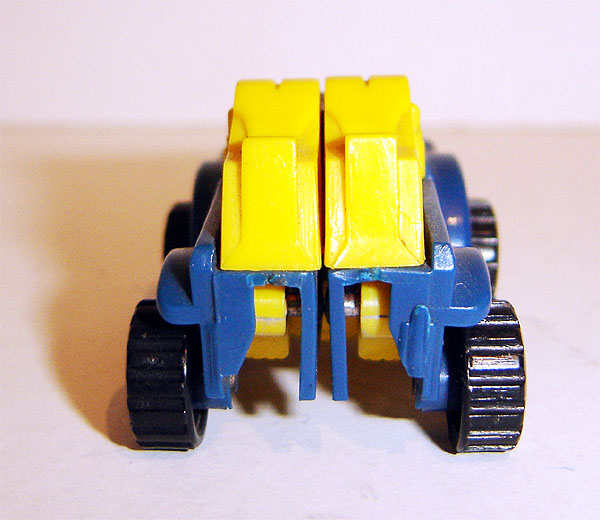
Although there is no chrome paint on the toy, the rods
that hold the toy together and the hubcaps/bolts on the wheels are still
metal. That again goes to show that the quality of these minibots is not
poor or substandard, despite the simplicity of the colour schemes and
the looks due to the lack of chrome.
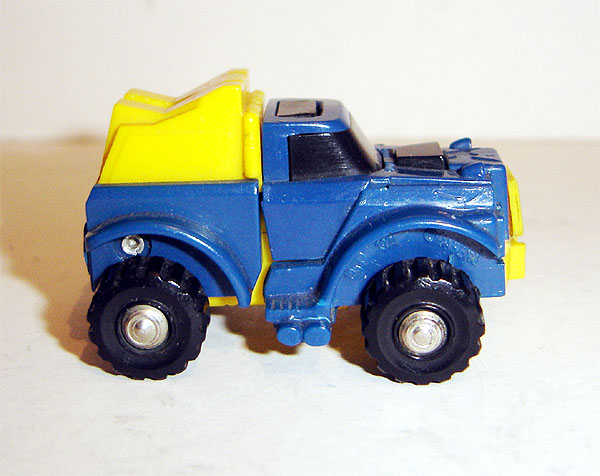
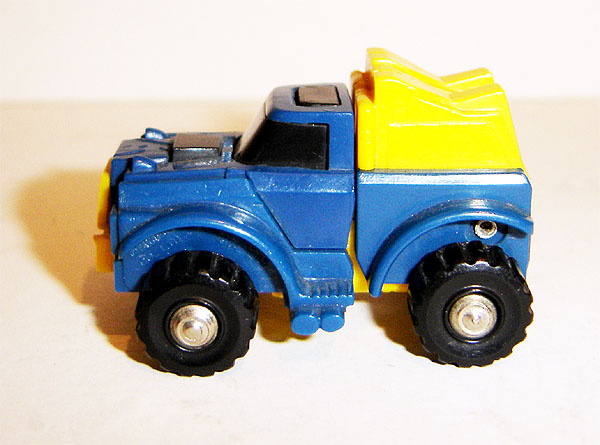
Two more nice views of a minibot that tends to grow on you very quickly. There's no doubt that it is a striking colour scheme and cannot be called dull. Among all the Peruvian minibots that I've seen so far, this Gears stands out the most with the possible exception of the red and yellow Huffer. Notice also the lack of grooves in the metal hubcaps on the Peruvian Gears. So far it's the only version of Gears I have seen without the grooves on the wheelcaps.
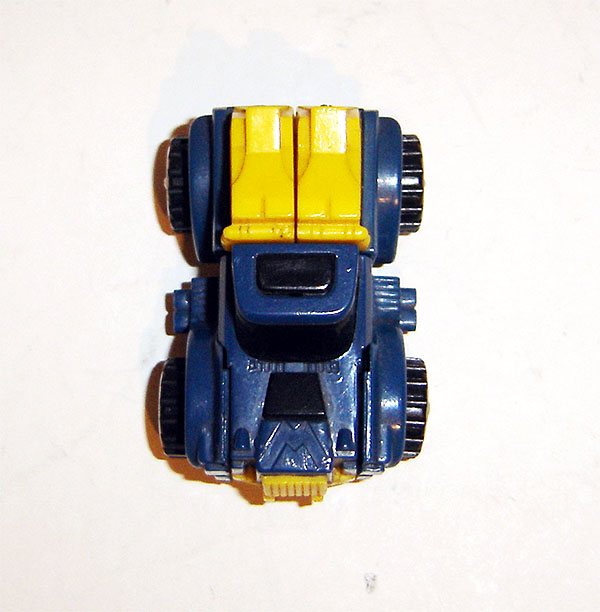
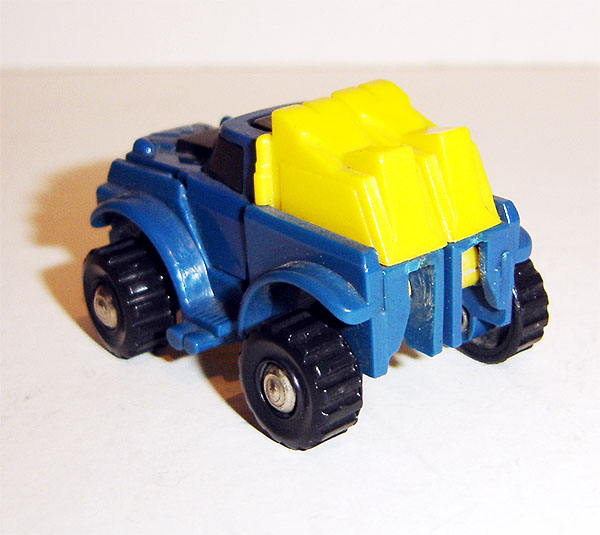
The first picture above shows that this Peruvian Gears has retained its Microman logo on the hood, as have all the other minibots that originally had them on display. I find that the Peruvian minibots tend to hold together and have tighter parts and joints than their Brazilian Estrela counterparts. Here's a closer look at the toy's copyrights under the front wheelarches:
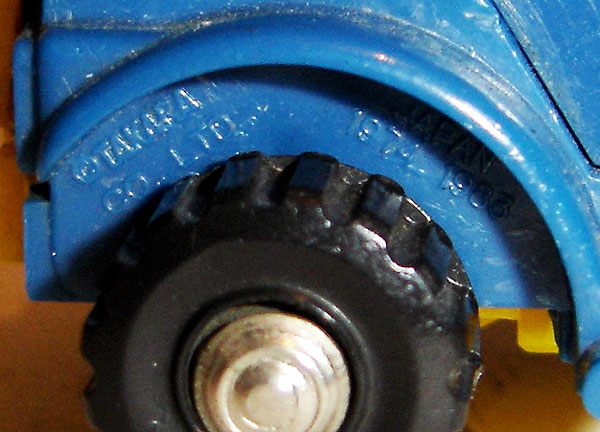
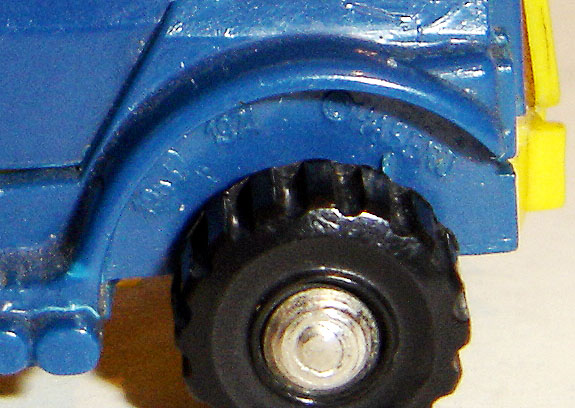
As I said, Hasbro/Takara stamped. These are Transformers, there's no avoiding that fact or the fact that their production was licensed by Hasbro. The only real mystery is WHERE they were produced and how many countries were they exported to? The only reason we ever found out about these toys was thanks to a number of informative Peruvian transfans. I personally don't know of any Venezuelan or Ecuadorian transfans and until we hear accounts from countries such as these we may never know the full extent of Lynsa's distribution of these toys. That is, assuming Lynsa were the only company responsible for distribution of licensed Transformers minibots in countries other than Argentina and Brazil...
Onto the robot mode:
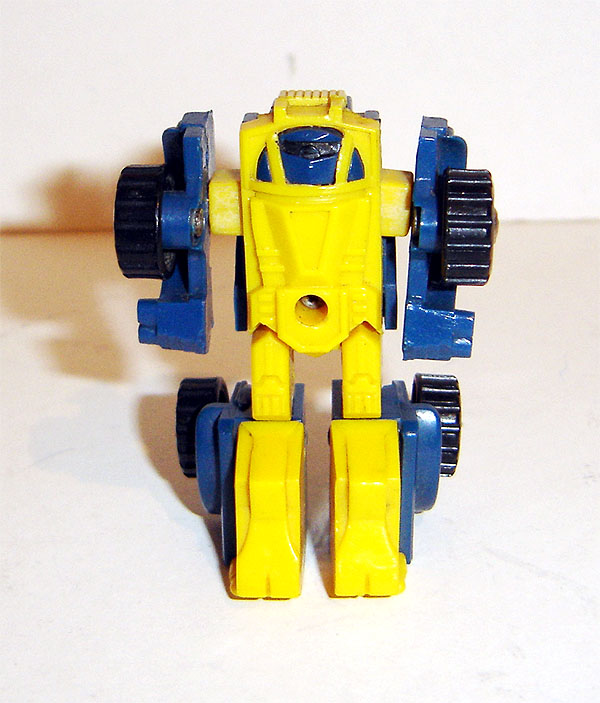
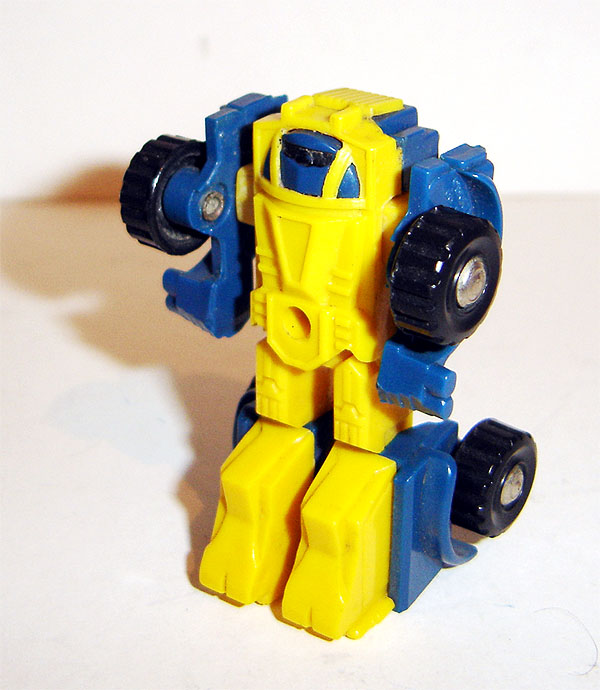
It's really in robot mode that the lack of chrome starts having an serious effect on the toy's appearance. Usually the chrome paint on Gears would provide a very clear separation between the feet and the rest of the torso via the legs. In the case of the Peruvian Gears, it seems like one big connected section, and can give Gears a very simplified and plain look. The distinct lack of stickers also contributes to a somewhat plain appearance. In the case of the blue/yellow gears though, the contrast in colour means that he still remains striking.
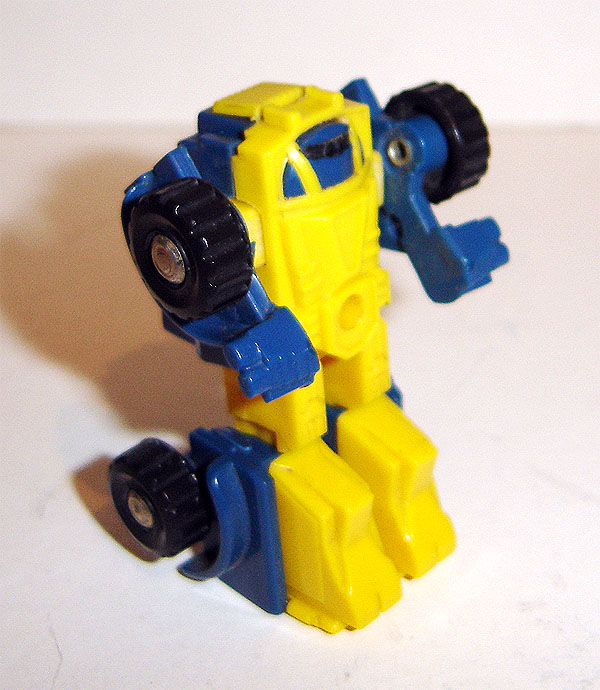

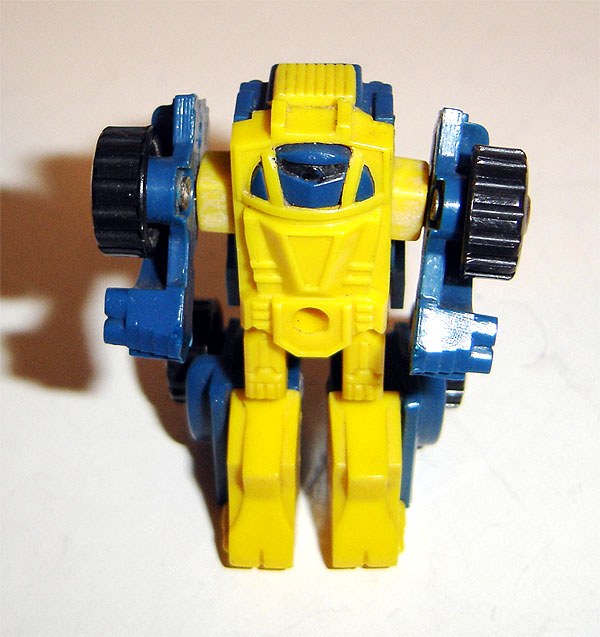
Now even though little spots on the mould look a little inferior to US Transformers (the area around the face), the joints don't exhibit the customary looseness of used South American minibots. The arms were tight enough to pose easily on this Gears. Here's a closer look at the robot head:
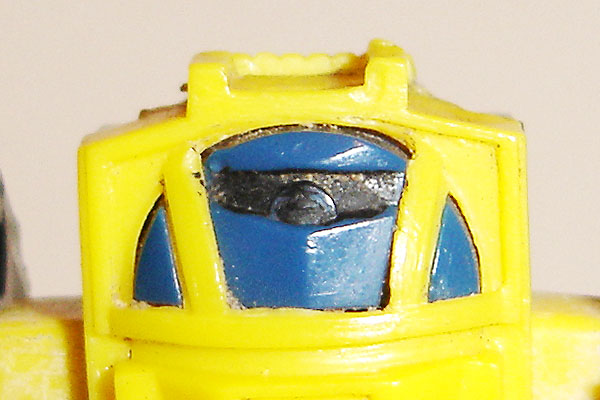
The inferior moulding around the face should be a little clearer in this picture, plus Gears appears to have a semicircular section just above the middle of his mouthplate. That is a feature shared with Mexican Gears and maybe rubsign US Transformers Gears.
Below are a couple of comparison pictures of the blue/yellow Peruvian gears with a pre-rub US Transformers Gears. The pictures will show the difference in blue plastic and also the unchromed Peruvian parts vs the chromed US parts:
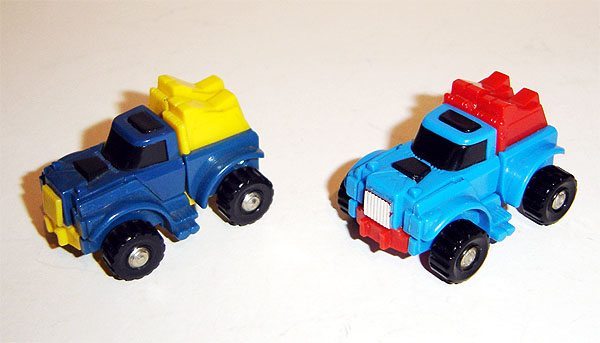
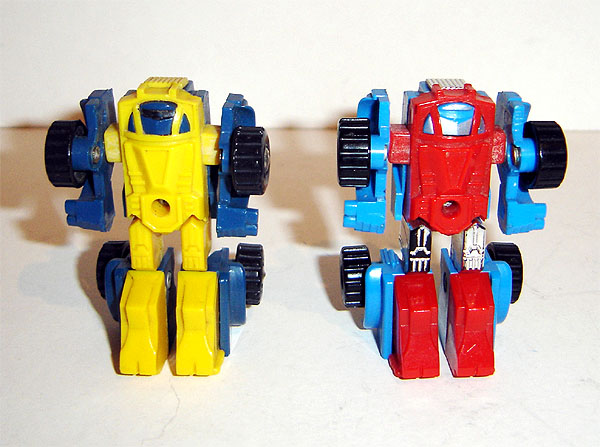
Now for a comparison of the Peruvian Gears alongside two Estrela Brazilian Pick-Ups:
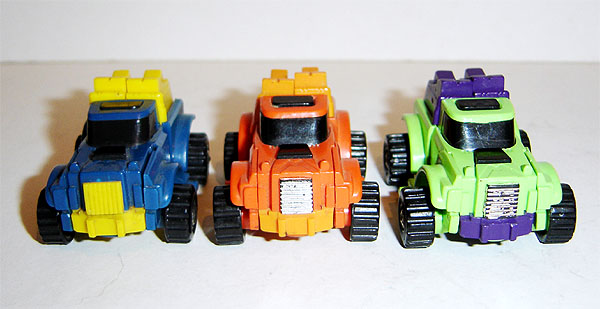
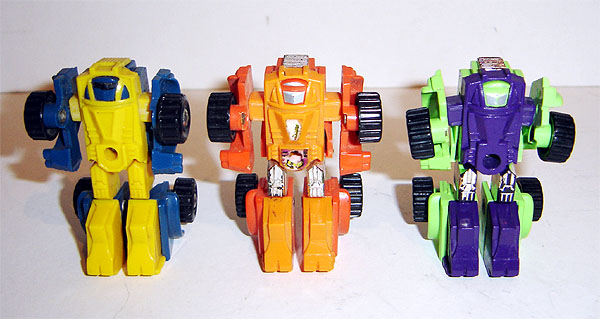
Notice in the top picture that unlike the Brazilian releases of the mould, Peruvian Gears actually does have the front grill positioned correctly with the grill lines running vertically, not horizontally like the Brazilian ones. The robot mode comparison shows the simplified Brazilian head sculpt but because of the lack of silver paint on Peruvian Gears' face, it ends up looking just as simple, possibly simpler. The difference in chrome vs no chrome is also very apparent in the above pictures. Having said that, the Peruvian Gears has tighter joints and fits together much better in vehicle mode.
So to summarise, here is what we have so far as very likely: US Transformers minibots were imported into Peru and stickered with BASA labels. Then the variant minibots were marketed and sold (possibly imported) in Peru and distributed by the company Lynsa. The toys are Hasbro/Takara stamped, come on Transformers cards with techspecs and proper names such as "Cliffjumper". Bumblebee, Cliffjumper, Gears, Brawn, Windcharger and Huffer were released in regular colours (or something very close to them) and apparently five repainted colours as well, giving a total of 36 possible Peruvian minibots. The quality of the toys is higher than you would expect from looking at them, and they do have metal parts but no chrome paint and no stickers. The Bumblebees and Cliffjumpers had plastic tires and unpainted faces. Why the lack of certain paints and materials? Probably to keep costs as low as possible.
And what about the future? What possible discoveries will be made? We all hope that more carded examples will surface but that could well be asking a lot. It has taken THIS long for LOOSE samples and cut techspecs to surface and even then in such seriously limited quantities and sometimes in damaged shape. Looking at the colours used, it is almost possible to predict what other colours are probably available; maybe red and yellow Gears, blue and yellow Brawn, blue Cliffjumpers and Bumblebees...but until they show up we can only guess and rely on childhood recollections. A lot of what I've written here may well be subject to change in the future depending on what else is uncovered by interested parties. One thing is certain, this remains a very exciting part of the Transformers universe and very much an unsolved mystery. Who on Earth would have guessed 5 years ago that there were at LEAST 30 more colours of minibots hiding away waiting to be discovered...


My utmost and deepest thanks to Jose Antonio Suarez Rojas, David Buenaño, Sandro Arias, Jose Luis Altamirano, Ras and Morg for providing vital information, priceless pictures and very kind contributions to make this article possible. Also if the owner of the carded orange Cliffjumper would like to come forward and claim the pictures, that's perfectly fine by me. But be prepared to be barraged with picture and info requests. Your choice ;)
All the best
Maz